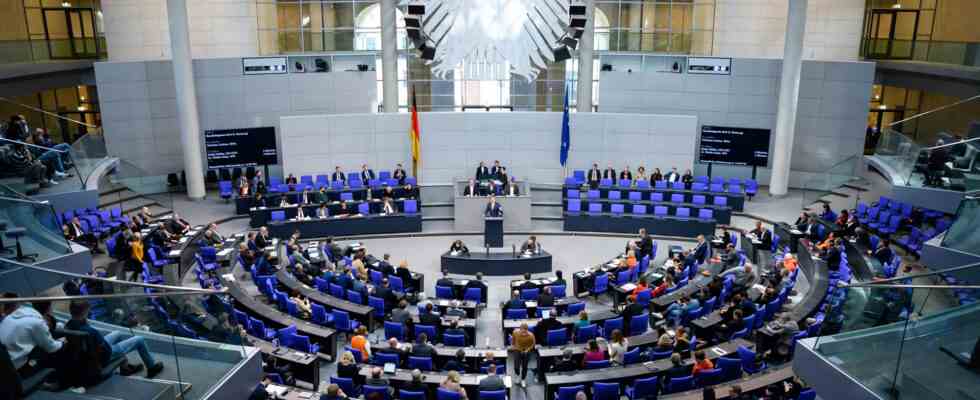Status: 11/25/2022 2:48 p.m
The Bundestag has approved the budget for 2023. It provides for loans of 45.6 billion euros in compliance with the debt brake. Numerous aids are to be financed during the energy crisis.
In the fight against the energy crisis, the federal government wants to take out loans of around 45 billion euros in the coming year and finance numerous aids for citizens and the economy. The Bundestag approved the budget for 2023. This is the first time since 2019 that the debt brake anchored in the Basic Law has been complied with.
In a roll-call vote, 379 MEPs voted in favor of the draft budget, 283 voted against. The Federal Council now has to deal with the budget in mid-December before the corresponding law can come into force.
Lindner speaks of record relief
“We are mastering the crisis, but we are not neglecting the future tasks of this country,” said Finance Minister Christian Lindner (FDP). Because of the poor economic expectations, loans are allowed despite the debt brake. Lindner spoke of record relief and record investments, the SPD budget politician Bettina Hagedorn of a budget “which is not only enormous in terms of volume, but also finds the right answers to the needs of the time”.
Above all, the Union criticized the fact that the budget for the Bundeswehr would not increase to two percent of economic output, as announced by Chancellor Olaf Scholz. Left and AfD generally saw the wrong priorities.
Total volume of 476.29 billion euros
The 2023 budget is the first to be drawn up under the sole leadership of the traffic light coalition. Lindner again emphasized that the budget is returning to the rules of the debt brake after the exception rule had been used in the previous three budget years – first because of the corona pandemic, and then this year because of the war in Ukraine. However, the federal government should not boast too much, said Lindner. There will still be an “enormous deficit” in 2023, mainly because of “crisis-related spending”.
Compliance with the debt brake is only possible because numerous expenditures, for example to cushion the high energy prices and to modernize the Bundeswehr, are outsourced to special funds. The regular budget for 2023 envisages spending of 476.3 billion euros and new debt of 45.61 billion. This new borrowing is at the limit of what is still permissible within the debt limit.
In the course of the four-day budget debate in the Bundestag, representatives of the opposition had repeatedly accused Lindner of trickery – in particular by resorting to credit-financed sub-budgets with which the federal government concealed its high level of debt.
Housing benefit, citizen benefit, tax relief
Large items have to do with the consequences of the Ukraine war and the high prices for gas, electricity and food. These include a housing benefit reform worth billions, a subsidy for heating costs for the needy and tax relief. For families that are particularly suffering from high inflation, the child benefit increases to a standard 250 euros per month and child. The previous Hartz IV will be replaced by a citizen’s allowance with significantly higher benefit rates and a new approach by the job center to the unemployed.
In addition, 48 million citizens have to pay fewer taxes. The state foregoes income of 18.6 billion euros by offsetting the consequences of inflation in income tax. In return, the basic allowance increases, i.e. the income up to which no tax has to be paid. Other benchmarks in the tax rate will also be adjusted. This is intended to compensate for the fact that people have less purchasing power due to high inflation.
Bundestag approves budget for 2023
Daniel Pokraka, ARD Berlin, daily news at 2:00 p.m., November 25, 2022
Review: “Already sewn to the edge”
The left-wing politician Gesine Lötzsch accused the traffic light government of anti-social policies. The standard rate increase for the unemployed does not even compensate for inflation, crisis winners would not be asked to pay. Lindner replied: “Social justice is measured by the fact that people who are in need are not left alone. But social justice also has another component, namely fairness towards those who carry this country with their work and pay high taxes and duties .”
The Union politician Helge Braun described it as problematic that no money was set aside in the budget for problems that are not yet known. “This budget is already sewn to the brim,” he emphasized.
Lindner admitted that the reserves were almost exhausted. The budget for 2024 will therefore be much more difficult than this one. “So we have no alternative: we have to remain courageous,” he said.
Budget week Bundestag: budget of the Ministry of Economic Affairs approved
Torben Ostermann, ARD Berlin, 25.11.2022 12:13 p.m

